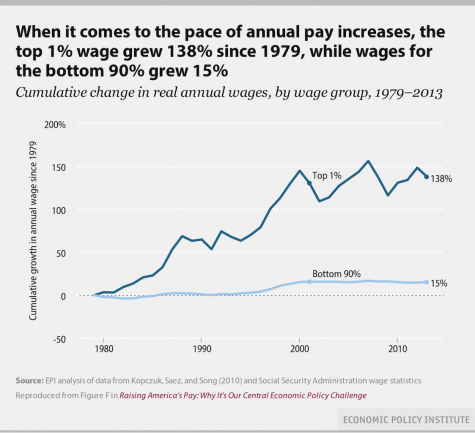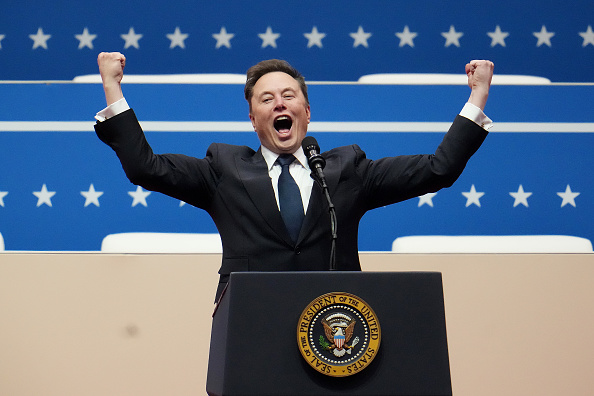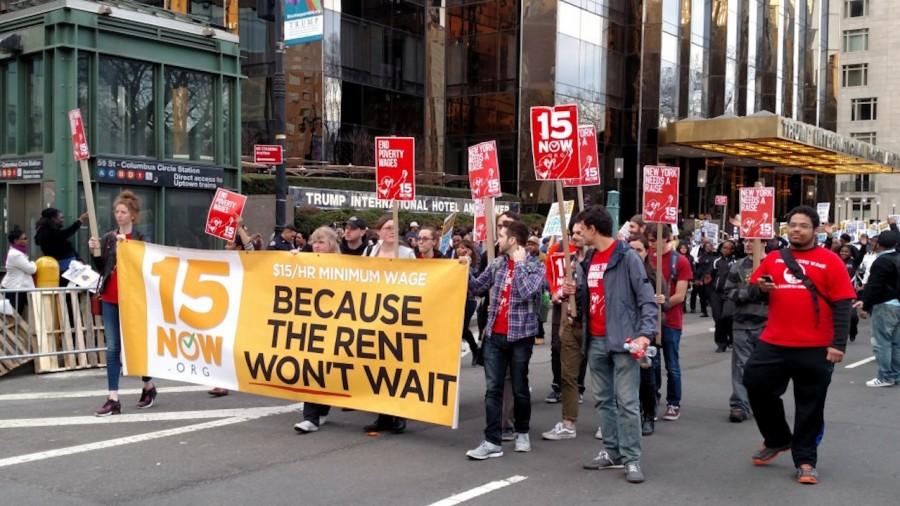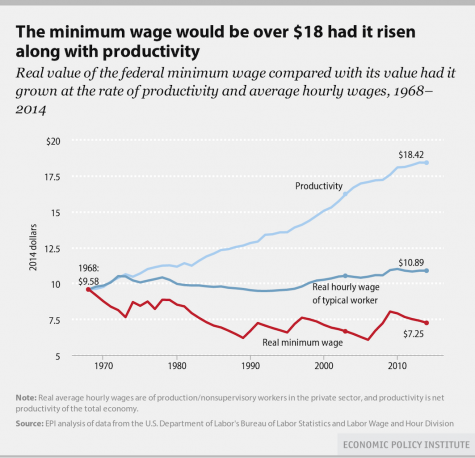Raise the minimum wage, but slowly
Demonstrators protest the federal minimum wage in New York.
November 20, 2015
The American economy is broken. Well…sort of. Although originally coined as the “American Dream,” opportunities for economic security in the United States have steadily fallen since the end of World War II.
Wage stagnation, however, is nothing new to the American economy. Normally, we would expect wages to continue to rise, keeping up at the very least with the inflation target of 2 percent of the national gross domestic product (GDP), set by the Federal Reserve System (Fed). However, according to the Economic Policy Institute, many wages have remained the same or even fallen in comparison to those from 1979, adjusted for inflation.
A place where people once believed anything was in the realm of possibility has most recently been plagued by public campaigns for greater wage equality, pitting the ’99 percent’ against the ‘1 percent.’ Evident through a display of rallies and protests in over 200 cities across the United States on Wednesday, Nov. 11, 2015, the American public seems to believe that a federal minimum wage hike is long overdue.
“I think wages need to probably go up a little bit just because there are so many people trying to make a living off of minimum wage these days. It didn’t used to be like that,” Mr. Tom Rickling, AP economics teacher at Cathedral Catholic High School, said. He explained that today, most of the people he sees working in fast food restaurants aren’t, in fact, the very same high-schoolers he sees every day in class. Instead, he sees an increasing presence of adults trying to make a living to support their families with. A lot has changed since Mr. Rickling was in high school, and he supports a modification of legislation to accompany this widespread change.
Though most can agree on the intended outcome of our actions and legislation, the path to raising the minimum wage, as any economist knows, will prove to be a precarious one. Sadly, the problem won’t be fixed simply by raising the minimum wage to a living wage. Instead, we must raise it gradually in order to avoid excessive trauma to the employment market and the economy.
“I think if they’re going to increase [the minimum wage], they need to do it very slowly, otherwise there would be a lot of problems that would ensue,” Mr. Rickling said.
I agree that it is high time for a change in employment legislation; however, there are three main problems with immediately raising the minimum wage to what would be considered a living wage.
First, by raising the federal minimum wage, businesses of all sizes would immediately have to pay a higher cost to employ their workers. People oftentimes neglect to remember that money for wages has to come from somewhere, and since running a business is all about yielding a profit, you can bet it would not come out of the business owner’s salary. Instead, it would most likely come from a combination of either employing less workers and even laying off some existing workers or increasing the prices of goods that the company sells to cover the costs of the mandated wage increase.
Even with an increase in salary, by decreasing the amount of workers at a store, a business owner can still spend the same amount on employee pay as they would have with a lower wage and more employees. So, without increasing the price of goods, business owners who still wish to make the same amount of money would have to decrease the amount of workers they employ. Those workers that were to remain at a business would be making much more than they were before the wage hike, but they would be working harder and longer than before. In addition, those that were laid off would be making nothing as a result of their job loss and would actually be tasking the federal budget balance as they collected their unemployment benefits.
As voters, we would have to decide which is preferable: giving almost everyone who wants a job the option for employment with a lower than living wage salary, or employing only about half as many workers, but with salaries and benefits that constitute a living wage. It’s a difficult moral dilemma, one that would take a long time to properly debate.
Instead of firing some of the employees, a business owner could also choose to raise the prices of the goods they are selling. That way, they would make a larger income to pay for the increased wages with. While this sounds like the proper fix, let us analyze this a little bit.
First, while the employees making the new minimum wage would initially have an increased disposable income, their costs would also eventually increase as every business owner who employs minimum wage workers also increases their prices. In this sense, there would be no net gain in disposable income as a result of an increased minimum wage because consumers would eventually foot the bill.
It is especially important to realize that those who do not work for a minimum wage salary and are either on welfare or have a higher paying job would be forced to pay more for the goods that support them without having a higher yearly income. This means that, not only would they be unincluded in the gain of income from the change, but they would actually be losing money and, for some, unable to afford things they used to buy often.
More likely, business owners would respond to a minimum wage increase with a combination of the two actions. They might lay off some workers – but not as many as they would have if they relied solely on worker equilibrium to cover the increase in employment costs. In conjunction, they might only raise the prices of their goods by a little bit, but not as much as they would have had they only relied on increasing prices to cover the costs.
This method would not only be better for the businesses, since they would be gaining income from multiple facets of their business, but it would also be better for the economy as a whole because the public that is not employed in a minimum wage job wouldn’t be paying as much and the federal government would be required to pay fewer unemployment benefit checks to those who lost their jobs from the increase in minimum wage.
Some may blame the CEOs of corporations for their greed, but our country and our economy are founded upon capitalistic principles so, “it’s hard…to say that’s a terrible thing when it’s [the business owners’] money and they’re the ones that founded the company. They’re the ones that put in the hard work and they’re the ones that get to reap the benefits,” Mr. Rickling said.
Alternatively, if we’re unhappy with our government-instituted minimum wages, we should look to our government, constituted by the congressmen and women elected to serve our interests.
Finally, the only way to beat the system is not to rely on it. Post high school education is becoming increasingly mandatory in many fields of work. Among other things, an education from any collegiate institution arguably allows for a higher salary and quality of life.

Increasing the minimum wage would falsely lead many to believe that a university education is unnecessary when, in reality, it is paramount for success in later life. While $15 an hour would allow a person to support him or herself initially, it would likely serve as an impediment later in life as their needs and desires, including the addition of children to a family, shift to require greater spending.
An investment in further education not only increases quality of life, but it also obviously increases the intelligence of a nation. As the economies of other countries begin to flourish, the United States is beginning to fall behind the educational curve. Many European and Asian countries have surpassed the average intelligence of America and we are increasingly labeled as ignorant and uninformed. To break this public image and compete with other countries, we must increase the percentage of Americans that has achieved a college education. Without this increase, America will be left in the dust as other countries begin to develop the newest advances in technology, sciences, and infrastructure.
Ultimately, though, the debate to raise the minimum wage is one of ethics and morality.
“Again it’s really one of those teeter-totter questions,” Mr. Rickling said.
“I think it’s important for people to be able to at least support themselves on any salary. It makes you feel more valued by getting that extra little bit of money; it doesn’t have to be much. I think it just gives people purpose, and they might even work harder.”
Aside from morality, raising the minimum wage slowly would also slowly wean people off of government aid programs like welfare and unemployment benefits.
So, no matter what angle you look at the problem, it makes sense to increase the minimum wage for better quality of life, sense of purpose, and savings to our government. But, as we raise it, we must keep in mind the potential drawbacks of raising the minimum wage too quickly. To the American people, I say: don’t get your hopes up, because raising the minimum wage correctly will require lots of time and patience. For now, the best thing an adolescent can do to secure an economically sound future is to aspire for a college education.























































